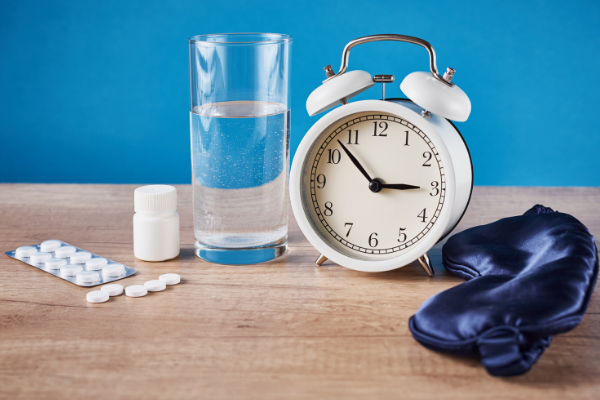Insomnia is a sleep disorder characterized by having persistent problems falling and staying asleep. This condition can either be acute (short-term) or chronic (lasting a long time). Insomnia can also come and go. Short-term or acute insomnia usually lasts from one night to a few weeks and chronic insomnia is when it happens at least three nights a week or over three months or more. Insomnia affects more than 3 million people in the United States every year. There are two types: primary and secondary. Primary insomnia means the sleep problems aren’t linked to any other health problem or condition. Secondary insomnia means the sleep issues are connected to a health condition like asthma, depression, cancer, arthritis, heartburn, pain, medication, or substance use. 
What Causes Insomnia?
There are several causes of insomnia. Primary causes can be linked to stress, things around like noise, light, or temperature, changes to your sleep schedule, or genes. Secondary causes of insomnia can be linked to mental health issues like depression and anxiety, medications for allergies, colds, depression, high blood pressure, and asthma, pain or discomfort at night, caffeine, tobacco, or alcohol or drug use, hyperthyroidism, pregnancy, sleep apnea, restless leg syndrome, ADHD, Alzheimer’s disease and other types of dementia, or PMS and menopause.
The Relationship Between Insomnia and Drug Addiction
Drug addiction falls under the secondary insomnia category. It is a secondary cause of drug and alcohol addiction. Sleep problems can happen with any type of alcohol or substance abuse. Insomnia can occur when a person is in active addiction and also when they seek treatment and start going through the detox process. The degree and nature of insomnia with addiction are different for everyone.
Sleep Management Among Patients with Substance Use Disorders
The National Institute of Health “Sleep Management among Patients with Substance Use Disorders” states:
“Various aspects of substance use are relevant to sleep. Drugs can have an acute impact on sleep by either increasing or decreasing arousal. Pharmacologically-specific sleep-related withdrawal symptoms may occur upon cessation or reduction of heavy, sustained periods of substance use. Problematic patterns of substance use may also lead to distress, which may in turn impact sleep via non-pharmacological mechanisms. Commonly used substances in the context of sleep-related problems include alcohol, cocaine, cannabis (marijuana), opioids and sedative-hypnotic-anxiolytic medication. A disturbance of sleep continuity has effects on next day functioning and behavior” (NIH)
Sleep issues are a common withdrawal symptom for people that are recovering from addiction. The first few days of withdrawal can be very difficult and lack of sleep only makes the withdrawal process more uncomfortable. After that, your whole body is out of whack or its normal rhythm. Active addiction changes the way your body works and this includes sleep patterns. In recovery, the body is changing again and trying to get used to being without substances, so it’s natural to experience disrupted sleep. Unfortunately, returning to a normal pattern of sleep after recovery can sometimes take six months or longer. The good news is that this is only temporary. A person in recovery can develop good sleep hygiene, which will help any withdrawal insomnia disappear. In addition, establishing sleep rituals, re-establishing your circadian rhythms, and trying natural approaches can all help an individual get back on track more quickly.
Start Treatment For Addiction and Insomnia at Evoke Wellness
Evoke Wellness offers a safe and comfortable environment for medical detoxification. Our patients are treated extensively so that minimal discomfort is experienced during the detox process. We provide residential treatment in a structured environment and then provide you with after-care support which is very important when coming off of crack cocaine. Evoke Wellness is here to help you get on the road to long-term recovery. Have you had enough? Are you sick and tired of being sick and tired? We are here for you around the clock. All calls are free and confidential.


